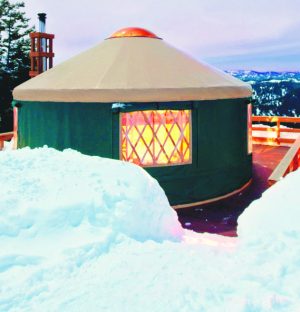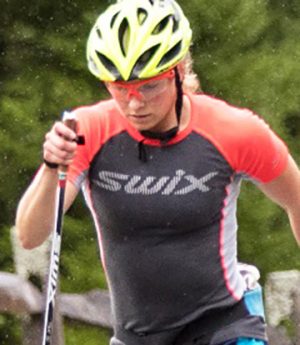March 12, 2008 (Olso, Norway) – Devon Kershaw from Sudbury, Ontario, is a 6-year veteran, a 2006 Olympian, and leader of the Canadian National Ski Team. With just two World Cup races left in the 2007-2008 season the 25-year-old Kershaw has already recorded over a dozen top-20 finishes. His season high result of a 5th place finish came just one week ago in Lahti, Finland in the 1.2km Skate sprint. Despite his sprint success Kershaw’s top-20 finishes this season have been a combination of distance and sprint races, in both techniques.
It was almost two years ago that Kershaw first stepped on to a World Cup podium after placing 3rd in a skate sprint in Borlaenge, Sweden in 2006. It was Canada’s first male World Cup podium finish in over 15 years. He followed that result up with a spectacular 2nd place skate sprint finish at the inaugural Tour de Ski last season. With the XC World Cup season winding down it will be interesting to see if Kershaw can capture his 3rd podium in three seasons. We caught up with Kershaw, who makes Canmore, Alta. his home, as he prepares for the XC World Cup finals this coming weekend in Bormio, Italy.
Is this your second full season on the World Cup circuit?
DK: Kind of; last season I did head over to Europe from early November right through until after the Tour de Ski (early January) competing at all the World Cups during that time frame. I came home in early January and spent quite a bit of time in Canmore (thus missing about a month or so of World Cups) preparing for the Nordic World Championships in Sapporo, Japan. Post Worlds it was back to the World Cup circuit in Scandinavia. So, I’d say this is my first “real” full season on the World Cup.
This year you’re consistently finishing in the top 20 – what do you attribute to your consistency this season?
DK: Consistency has been my number one objective every season I’ve raced at the international level. That might sound funny, since you’d expect the normal “kill it at a championship” as a primary objective. Yet when you look at the results page at championships, more often than not (doping cases aside) it’s people that are consistently “up there” internationally that come away with the championship medals. To give yourself the best chance for any great results internationally I believe that you need to first be able to consistently be a contender. Last season I was on track, racing well for the first part of the season before falling ill in January; I raced average at Sapporo and horribly in Scandinavia to close the season.
Factors that I believe help me race consistent (laughs) as in actually answering your question)? I was driven to do a better job this season to avoid a similar pattern that beleaguered me last year. Below are some things I attest to my consistent season (in no particular order):
– Working closely with Steinar Mundal (our NST coach from May-Nov). He was a great asset, and really taught me to truly “think for myself, and assess where I am at.” I learnt a lot about what it takes to be a great international skier from his wisdom, years of experience, and ideas.
– Training! Especially early in the racing season. I think it’s a mistake when people have one bad race in early November and hit the panic button large scale jamming on the breaks. You need to keep up with good training through November and December if you hope to make it until late March. It was a bit scary at first training 20+ hr weeks while racing World Cups but after two seasons of placing in the top 20 early in the year while training at “volume,” gave me confidence. I feel that consistent training throughout the year has helped me keep my level high. I just make sure to be smart about it, listen to my body, and vary my training speeds.
– I listen to my body. If I feel good, maybe I do a bit more. If I truly feel tired, maybe I cut it down a bit, or slow down my training speeds. I am constantly adjusting, analyzing and trying to stay positive – “trying” being the operative word. There’s no such thing as “being tough,” in your training. Too often I think people make stupid mistakes they can’t come back from by trying to “tough out” poor quality workouts or garbage intensity sessions.
– Working with our NST staff, programming and environment. It wasn’t only working with Steinar – our staff is driven to working with me to optimize my training and adapting it to my goals. Of course I knock heads every once and awhile, but sometimes that’s needed. Dave Wood’s dedication and passion is something I marvel at as well. He lives, eats, sleeps international ski racing and that attitude rubs off. It reminds me what it takes to be truly great.
You’ve proven you can race with the best in the world. Many times this season you’ve been in position for a possible podium in distance races until the final few kilometers. What’s it going to take to notch that podium finish?
DK: Tell me about it. I can’t even tell you how many times I’ve finished 16th in distance races this year. I am sick of it!! Haha. I truly believe it will just take another year of diligent, smart training. I have been improving every season, so if I keep working hard, making smart decisions, and learning from the mistakes I’ve made – not only with training but in all aspects of becoming internationally great – I believe I will get there. It will just take some more time. Also I must continue to improve my tactical racing. In individual start racing I seem to be on pace for a top finish for most of the race, until the last two or three kilometers. Some of that is training for sure, but maybe I need to look closer at my pacing. In mass starts this season I have been able to handle the pace of the lead pack for the whole race, yet end up 16th at the line.
I have made a few poor and costly tactical decisions (such as following the wrong dude, getting tangled on hills, choosing a poor finishing lane etc…) this season that haunted me, and with a little more experience, more quality training, and more confidence I can bridge that gap. There’s a reason why Hetland, Angerer, etc. win a lot of mass starts: they are incredibly wily racers.
You’ve stood on the podium as a sprinter but at distance racing is your best race, a podium finish, yet to come?
DK: I hope so! With only three races left on the World Cup I’d like to close off the distance racing season on a high note. As I’ve said this season has been great as far as consistency is concerned, but I haven’t achieved a podium finish, which eats at me slightly. It’s something I’ve achieved the last two seasons in a row, so the streak is in danger of being over!
In a few sprints this year I had great opportunities, but couldn’t seem to capitalize, and with the distance racing I feel I’ve raced “well” most of the season, but I am still pushing for that “stellar” performance which will propel me to stand with the World’s best. Still, as Cal (our team sports psych) would stress – “focus on the process.” Wins are the goal, but I have my hands full staying on top of everything that needs to happen before you cross that finish line first.
Often your classic technique is highlighted but your World Cup success isn’t limited to one particular technique. Is there a distance/technique event on the race schedule that you think to yourself “that’s my race”? I used to think so, but now I’d say no. In years past I would have said the prospect of a skate sprint, or a 15km classic individual start race would get me pretty pumped up. This season, I have had similar results in 30km skate, 15km individual classic and skate, classic sprinting, skate sprinting and pursuit racing.
Now, I seem to get excited for every opportunity that arises since I believe that in any race I can crack one out. That gives me confidence each weekend and is also exciting because if I can just get a little faster I’ll be that much closer to my goal of contending with the best skiers in the World all year long (including the overall World Cup). I wish I was racing during the days of the 10km classic/15km pursuit skate weekends. Wow, that would have been a weekend to get fired up about.
You had to make early exits due to sickness at both the 2006 and 2007 Tour de Ski. Is there something you’ve learned or is it just the luck of the draw?
DK: The illness that plagued me at the Tour these past two seasons is something that drives me crazy. Both years I had based my training and goals around that event and both years I’ve had to make an early exit.
I think in some ways its just bad luck, you know someone in the kitchen sneezes on my plate before it gets to my hungry hands. Although I really want to take that “bad luck” aspect out of the equation as much as I can. I will look closely at the lead up and preparation surrounding that event and come up with strategies with our NST team to see what we can correct. It’s been a sore spot these past two years because I believe that the Tour is the race for me. It combines all aspects of ski racing, and I seem to be able to race all disciplines and distances at a good level. It remains my biggest goal next year, so I will be extremely diligent at solving my illness issues and try and come into the race flying.
How many hours do you train in a year and has that number peaked or is the key to continued/improved success on the World Cup more training hours?
DK: Last season I completed 760 hrs and this season looks like it will be closer to 800. I think you need to train around there if you want to be successful at my age and level because maintaining a decent training load allows you to keep your shape for an entire season.
Everyone is different though, and may count their training differently than I do. I can honestly say that I have never chased hours and I am surprised at the end of the year to see how many “hours” I’ve completed. My whole deal is to train as smart, effective and as focused as I can. Being an hour monger doesn’t help you be great. Throwing down a huge block of garbage training will result in garbage results. Yes, you have to train hard, but if that’s all you do then kiss great results goodbye.
There are times when it’s “normal and planned” to be tired and push through to complete a big week of training and there are times when you have to sacrifice a few hours in your week because you’re bagged, and it’s not a good time to be tired. My advice is to not get caught up in the “hour game” and learn what YOUR body needs, and how it reacts to training. At the end of the season, it’s YOUR name on the results sheet, so it’s up to you to truly get know yourself to make sure you are doing things properly.
Top News Stories
Interview with Canadian NST Member Devon Kershaw
by Jeff EllisLeave a Reply
You must be logged in to post a comment.






![National camp action [P]...](https://skitrax.com/wp-content/uploads/2019/08/Duluth-4-2019-08-08-at-10.46.51-AM-300x246.png)
![Matt Liebsch on the CXC Elite Team [P] CXC...](https://skitrax.com/wp-content/uploads/2019/08/Matt-Liebsch-CXC.2-525x700.4-300x267.jpg)
![Dan LaBlanc [P]...](https://skitrax.com/wp-content/uploads/2019/08/Dan-LaBlanc-img_1855.3.jpg)

![Devon Kershaw[P]Morten Byskov](http://skitrax.com/skitrax22/images/skitrax/47d7fa1ada87cKershaw.4.jpg)
![Devon Kershaw[P]Arnd Hemmersbach/NordicFocus](http://skitrax.com/skitrax22/images/skitrax/47d7fa59e44c7Devon_Kershaw.TdS.jpg)